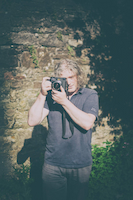March 20th 2015 #eclipse2015
Much patience was needed to get a view of the near-total solar eclipse visible over Ireland today.
I had already planned my location and was ready to go with equipment prepared, camera batteries charged, memory card formatted and the correct lenses and filters. I also had a plan of what style of shot I wanted to get.
Sunrise was around 06:30 and the obscuration of the sun was due to begin just after 08:20 and last until after 10:30. That's not bad, a respectable time to be on location for.
The morning was sunny but with a lot of cloud, I wasn't hopeful as I approached my location walking over rocks and along the shore of a lake but as I got closer the skies brightened up with plenty of blue visible above. It was looking good although there was over two hours of action to wait for.
And of course, the inevitable, just after 08:20 the clouds began to arrive fast it seemed like I was on the meeting point of two systems with clouds arriving from different directions, from my vantage point the solar eclipse didn't happen for the first half, it wasn't until after 09:30 that a break in the passing systems allowed quick, furtive views of the event.

It did get very dark, both due to the 93% obscuration of the sun and also from the thick clouds, in the distance I could see high ground that remained in sunshine throughout. I imagined viewers of the spectacle stood on the ridge, 30 minutes drive from where I was, watching without any interference from those pesky clouds.
It was quiet, with no roads close by, the only sounds came from geese, gulls and cows on an island and all got more agitated as it got darker like some end of the world scenario. The small birds that are normally tweeting in the hedgerows had, by now, stopped.
At this stage my original plan for the morning's action was thrown out of the window, now it was getting an image - any image - that mattered.
I didn't get a chance this time to get the scene that I had planned, there's always next year.
No wait, what? It will be 2026 for the next solar eclipse of this magnitude in Europe!

